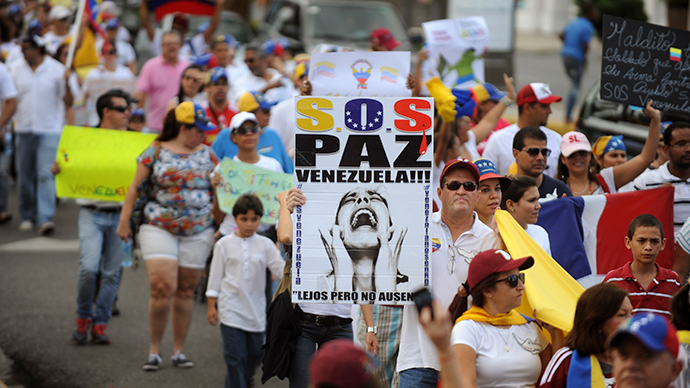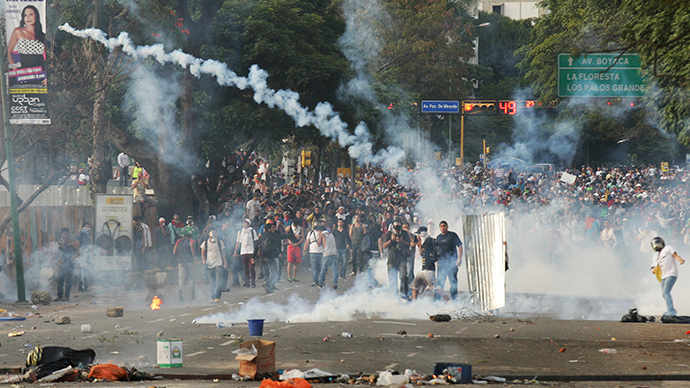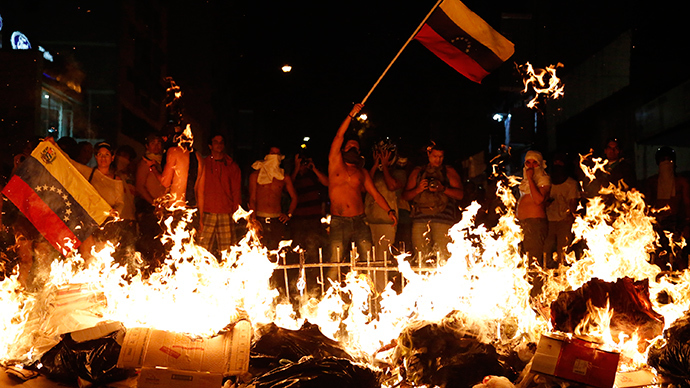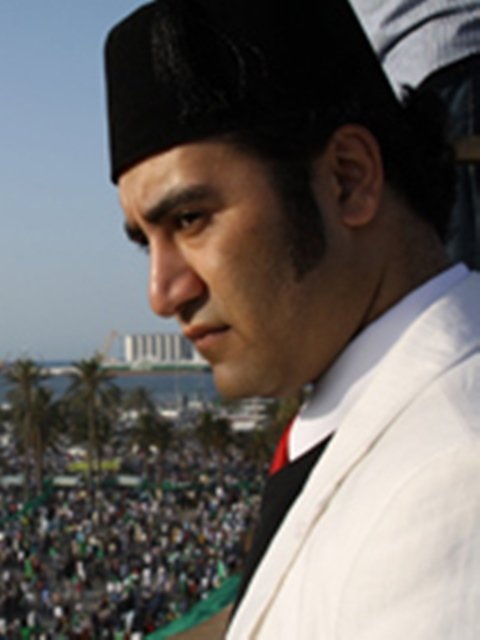Venezuelan opposition takes cue from Euromaidan?

The opposition leaders in Venezuela are taking their cue from the anti-government protesters in Ukraine by applying the same disruption strategy that has been used in Kiev.
The aims of the opposition are to create a paralyzing political crisis in Caracas, which they can manipulate to make gains they failed to get with the ballot box under the framework of democracy.
The mainstream opposition, however, doesn’t enjoy wide support. Mainstream opposition leaders have failed to earn a popular mandate from the majority of the population, or to secure the confidence of most Venezuelan citizens during the Latin American country’s elections. Failing to win any of Venezuela’s presidential elections or most of the South American republic’s parliamentary, regional, or municipal elections in the last fifteen years, the leaders of the mainstream opposition are now resorting to color revolution tactics and a Ukraine-style disruption strategy.
The key intentions of the anti-government protest leaders are to delegitimize and beleaguer President Nicolas Maduro and the Venezuelan government. The anti-government protests are ultimately intended to divide and fragment the governing United Socialist Party internally, put its political allies under pressure, force the Venezuelan government to make concessions, and open the door for an opposition takeover of Caracas, either through the collapse of the government or through some type of coup.
The pretext for the anti-government protests are socio-economic misgivings about political corruption, rising crime, inflation and shortages. The motives for the opposition leaders, however, are altogether something else. These opposition leaders and their backers are actually manipulating the majority of the protesters.
Autocrats and oligarchs masquerading as disenfranchised democrats
It has to be kept in mind that the leadership of the mainstream opposition in the Coalition for Democratic Unity (MUD) is either comprised of Venezuela’s oligarchs or directly supported by them. Before the Chavez era, these oligarchs actually repressed any form of functioning democracy in Venezuela and treated the country like its personal property. Venezuela actually became a functioning democracy under Hugo Chavez, while these oligarchs, kicking and screaming, resisted Chavez’s democratic reforms.
Amnesia and outright hypocrisy is at work. Poverty was magnanimously higher, injustice was far reaching, and Venezuela was a far more mismanaged, dysfunctional, and corrupt place under the rule of these oligarchs. Living in their gated communities in East Caracas or in places like Miami or Madrid for part of the year, they ignored the majority of the population living in slums or poor residential areas. That is why the improvements that have been made for the majority of the Venezuelan population in the Chavez era do not even remotely register on their cognitive radars. For the oligarchs, the function of the government is to simply serve them alone.
The Venezuelan opposition’s grievances about high inflation and corruption are absolutely hypocritical. Corruption was chronic under them and inflation was countless times higher when they were in charge of Venezuela. As for the issue of crime, it is usually tied to Latin America’s oligarchs themselves.

These wealthy bandits have themselves been the ones behind the price hikes inside Venezuela. Their group has done everything possible to sabotage the national economy and the government’s development projects. The oligarchs have literally been waging an economic war to cripple both Venezuela and its government with the aim of getting enough ordinary citizens to support the MUD’s takeover of the country.
The leaders of the anti-government protests represent the Venezuelan autocrats of the past. These autocrats are simply masquerading as democrats with the aim of getting all their old privileges back, with the help of the US government.
The arrangement that the Venezuelan oligarchs have with Washington is that they will revert Venezuela into an obedient US vassal when the US government helps them return to power.
The US government has continuously lied about the democratically-elected government in Venezuela by referring to it as a dictatorship and to the United Socialist Party’s MUD opponents as disenfranchised democrats.
It just so happens that the supposedly MUD disenfranchised democrats run many Venezuelan municipalities and several of Venezuela’s state legislatures and governorships. It also so happens to be that corruption is the highest in the areas where they form the local government.
The oligarchs still control most of the Venezuelan mainstream media; they own most of the South American country’s private corporations, and are still the wealthiest group in their society.
Even the faction of student activists that the leaders of the mainstream opposition are hiding behind comes from privileged families that can afford to send their children to private universities.

It is also important to point out that most of the students in Venezuela do not support the anti-government protests, or the violent anti-government riots that the protests transformed into. A great part of the student body in Venezuela, from the public universities, belongs to the pro-government camp and have been demonstrating in support of President Maduro and the Venezuelan government.
The undemocratic nature of the mainstream Venezuelan opposition
The US-supported mainstream opposition in Venezuela has used every opportunity and available means to take control of the country, including the instigation of Ukraine-style street violence on several occasions. Where MUD opposition leaders have failed to get popular support or to win democratically via elections, they have used trickery and force, attempted coups, waged intense propaganda campaigns, and have continuously colluded with the US government. They have refused to recognize or respect electoral results, and done everything to disrupt and delegitimize the democratic process in Venezuela.
When Nicolas Maduro won the April 2014 presidential elections, the MUD candidate cried fraud and instigated street violence with the initial support of the US government. Exposing the elitist nature of their political project, attacks tied to the mainstream opposition targeted public hospitals and clinics. Even when the Electoral Commission did its best to meet the MUD’s list of ever-growing demands, Governor Henrique Capriles Radonski declared the entire presidential election a Chavista hoax and ignited street violence. Hypocritically, US-based human rights organizations ignored the MUD’s role in inciting street violence and took the opportunity to condemn the Venezuelan government. US-based organizations like Human Rights Watch lectured the Venezuelan government about corruption, while never even addressing the MUD-governed hotbeds of corruption in Venezuela.
Capriles and MUD created political instability as a means of justifying the mainstream opposition’s strategy to work outside of the framework of elections and democratic norms. This is where the embezzler Leopoldo Lopez Mendoza comes into the picture.
Leopoldo Lopez was a key figure in instigating the anti-government violence in front of the Miraflores Palace, which was used as a pretext to declare the Venezuelan government illegitimate as a pretext for the opposition coup in 2002.

During the anti-Chavez protests in 2002, opposition leaders pushed for bloodshed and made sure that people would die, reportedly they planted armed gunmen among protesters who fired at civilians and the security forces. Once enough people died, the oligarch-controlled mainstream media quickly constructed a false narrative to sell the opposition coup. When the short-lived 2002 coup took place, Leopoldo openly supported the suspension of democracy in Venezuela and happily signed the Carmona Decree to dissolve all democratic institutions. Several years later, in 2007, he was caught red handed on tape while the opposition leader Alejandro Pena Esclusa was talking about the strategy of creating a political crisis in Venezuela to delegitimize the government with the ultimate goal of making it collapse.
(Dis)information war and Venezuela end game
The mainstream opposition in Venezuela has been running a dishonest disinformation campaign that has been backed by mainstream media outlets in countries like the US and Spain. A distorted narrative about the anti-government protests and riots is being constructed, which is similar to the propaganda campaign that was launched in front of the Miraflores Palace, which led to the US-supported coup against President Chavez.
Doctored and unflattering images from other parts of the world, ranging from Brazil to Greece, have been used to slander the Venezuelan government. Images of pro-government rallies are being presented as footage of opposition supporters. Through social media and opposition ownership of most of the mass media in Venezuela, the opposition camp has whitewashed the riots and violence that targeted state infrastructure, the public transport system, civil servants, government officials, small businesses, and innocent civilian bystanders. The distortion of the anti-government protests is merely the newest chapter in the oligarch’s propaganda war.
Ironically, the opposition-controlled mainstream media consistently argues that there is no media freedom in Venezuela. The government, however, has never prevented them from making their claims about not being free to report what they want. The truth is that the government has held several networks accountable on several occasions for gross lies.
A segment of the anti-government protesters are rioters who deliberately perpetuate a campaign of violence. Public property has been systematically damaged, Molotov cocktails have been used to attack cars and buildings, and firearms have been used on people. An armed gunman instigating violence from amongst opposition protesters has even been caught on tape.
While Leopoldo Lopez has been putting pressure on the government from the street, Governor Capriles and other MUD leaders have opened a dialogue for concessions from President Maduro. This is part of the same strategy that has been applied in Kiev against the Ukrainian government.
Regime change in Caracas would be a prerequisite for the dissolution of the US-takeover of the Bolivarian Alliance for the Peoples of Our America (ALBA) and the Community of Latin American and Caribbean States (CELAC). ALBA and CELAC are viewed as threats to Washington’s domination. Both are also competitors to the Organization of American States (OAS) and any US economic regional plans, such as the Free Trade Area of the Americas (FTAA/ALCA). With Venezuela out of the way, the US could resume its blockade of Cuba and encircle Ecuador, Bolivia, Nicaragua, and their regional partners.
The statements, views and opinions expressed in this column are solely those of the author and do not necessarily represent those of RT.
The statements, views and opinions expressed in this column are solely those of the author and do not necessarily represent those of RT.













